Key takeaways:
- Study efficiency apps, tailored to individual needs, enhance productivity by managing tasks, tracking time, and enabling collaboration.
- Key app features include user-friendly interfaces, task management capabilities, progress monitoring, and cross-device syncing for flexibility.
- Popular study aid apps like Anki, Notion, and Quizlet offer engaging ways to improve retention and gamify learning experiences.
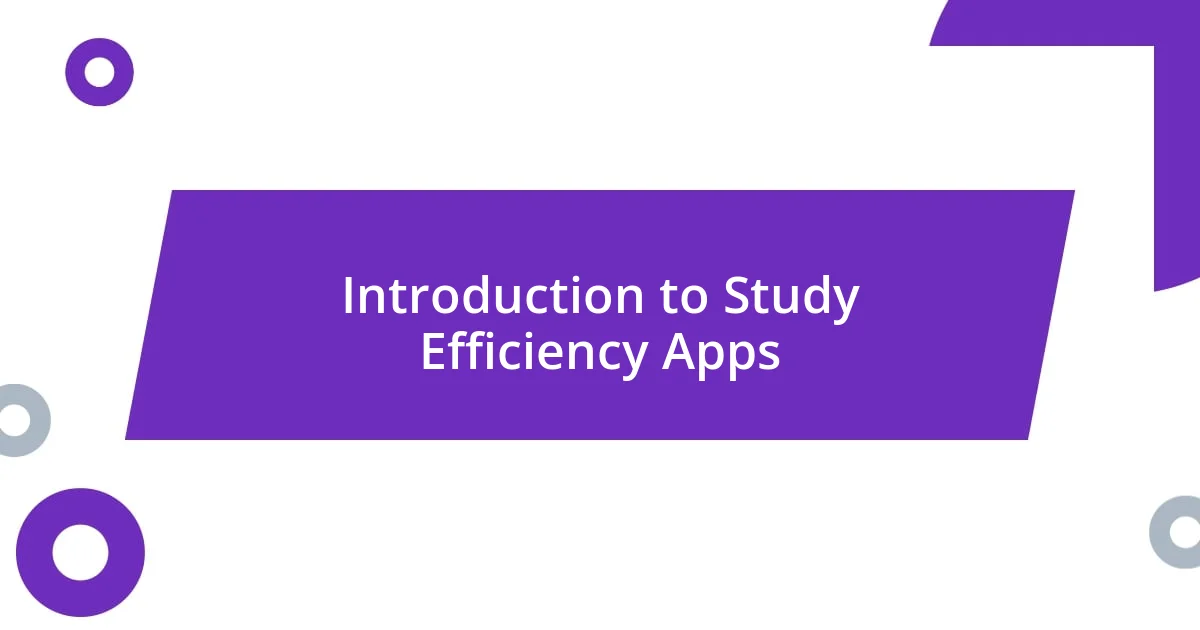
Introduction to Study Efficiency Apps
When it comes to studying effectively, the digital age has blessed us with a plethora of study efficiency apps that can truly transform our approach. I remember feeling overwhelmed during my college years, juggling assignments, readings, and exams. It was through discovering certain apps that I finally found a rhythm that worked for me; have you ever felt that sense of relief when everything just clicks into place?
These apps cater to various aspects of studying, from time management to organizational skills, ensuring that students stay focused and motivated. For instance, I often turned to a task management app to visually map out my assignments and deadlines, which made a world of difference. It’s fascinating to think about how a simple tool can turn chaos into clarity, don’t you think?
Moreover, the choice of app depends on individual needs, making it easy for anyone to find the perfect fit. Whether you’re a visual learner or someone who thrives on schedules, there’s something out there for you! I always encourage my friends to explore these options, and many have shared how they’ve been able to enhance their productivity just by incorporating a few well-chosen apps into their routine. What tools have you found to be game-changers in your studying journey?
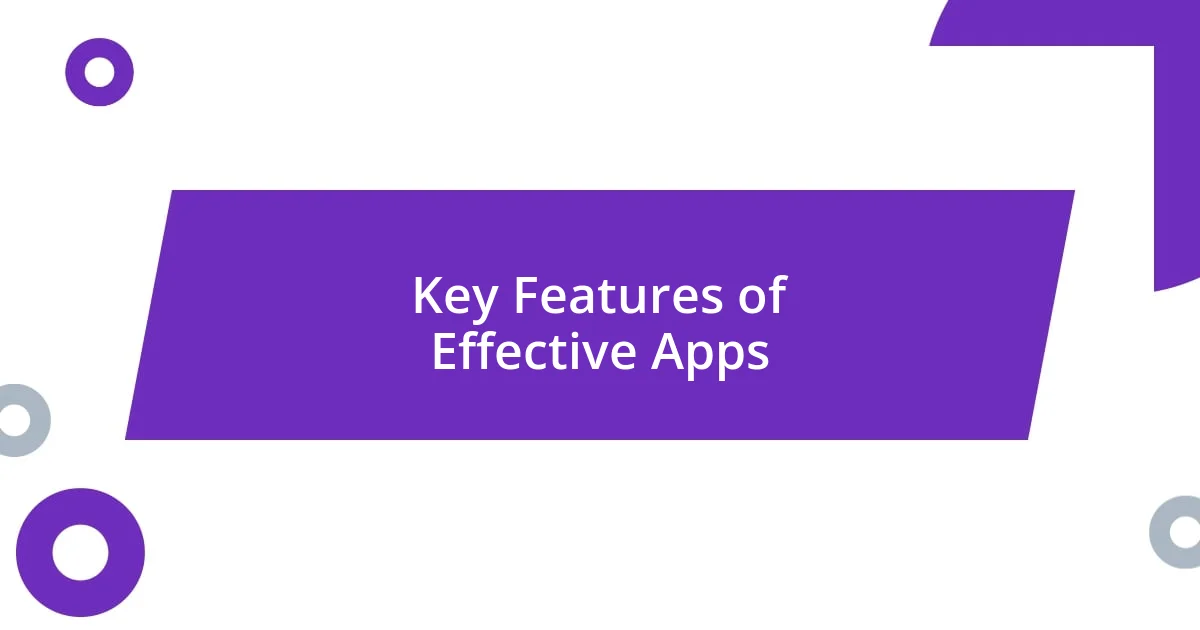
Key Features of Effective Apps
Effective study apps should have features that cater to individual learning preferences while promoting efficiency and productivity. From my experience, the most useful apps provide a user-friendly interface that simplifies navigation. It’s frustrating to spend precious study time trying to figure out how to use the app, so intuitively designed apps truly stand out for me. Plus, having customizable options can really boost one’s motivation; I love being able to tailor the app to my specific study needs.
Here are some key features that I believe make study apps effective:
- Task Management: Clear lists to track assignments and deadlines.
- Time Tracking: Built-in timers for managing study sessions and breaks.
- Progress Monitoring: Visuals that show how much you’ve accomplished over time.
- Collaboration Tools: Options to work with classmates seamlessly.
- Cross-Device Syncing: Access your study materials on any device to enhance flexibility.
In my personal journey, encountering an app that synced across devices was a game-changer. I remember studying in a café and realizing I needed a specific document. I easily accessed it from my phone, and that moment highlighted how vital convenient features can be in staying on track.
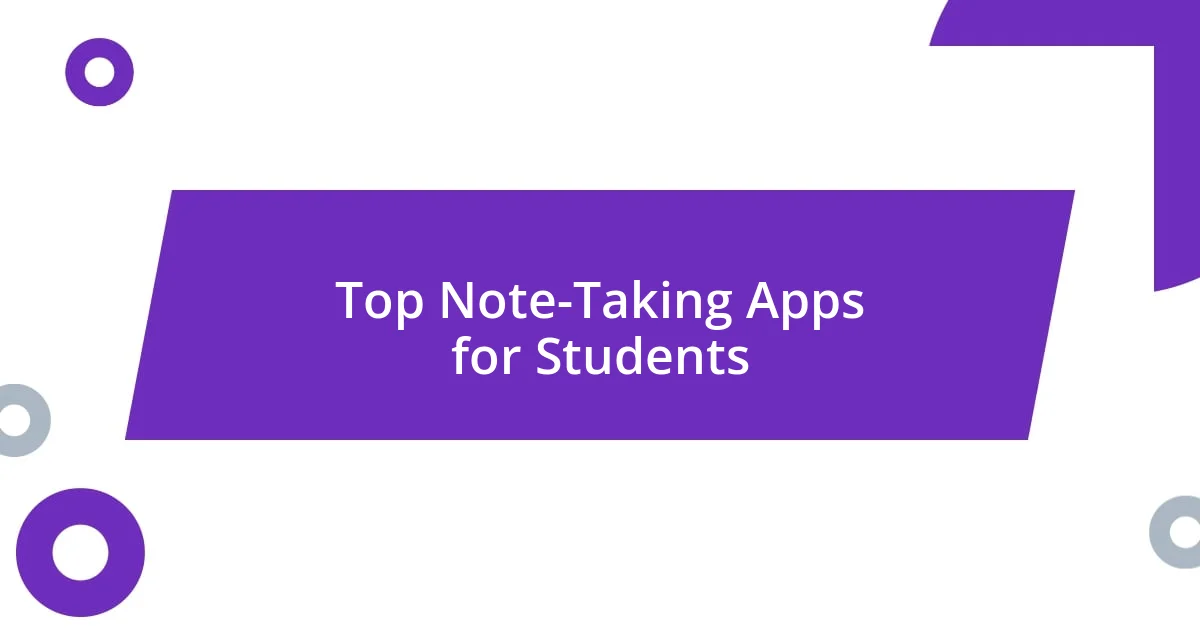
Top Note-Taking Apps for Students
When it comes to note-taking, choosing the right app can really enhance your studying experience. I’ve found that some of the top contenders include Notion, Evernote, and Microsoft OneNote. Each serves its purpose, but I personally lean towards Notion for its versatility; I love being able to create a structured workspace that can adapt to my needs. Have you ever wished you could organize your notes and tasks all in one place? This is where a note-taking app shines, providing a streamlined way to capture ideas and important information.
In my experience, Evernote stands out for its powerful search functionality. I still recall the time I desperately needed to find a specific lecture note for my exam preparation. Thanks to Evernote’s tagging system, I located it within seconds, leaving me time to revise instead of frantically searching. This kind of efficiency can drastically reduce stress during exam weeks, wouldn’t you agree? I’ve realized that having things at my fingertips can change the game, especially when deadlines are looming.
Moreover, OneNote offers a unique approach with its digital notebook layout, which I enjoy for its freeform structure. It feels like a canvas where I can mix text, images, and sketches, reflecting my thought process. I remember a study group session where we collaborated using OneNote; the instant syncing meant everyone could contribute simultaneously, leading to vibrant discussions and a wealth of shared insights. It’s truly captivating how the right note-taking app can elevate our collaborative study efforts.
| App | Key Features |
|---|---|
| Notion | Customizable templates, integrated databases |
| Evernote | Powerful search, intuitive tagging |
| Microsoft OneNote | Freeform organization, collaborative features |
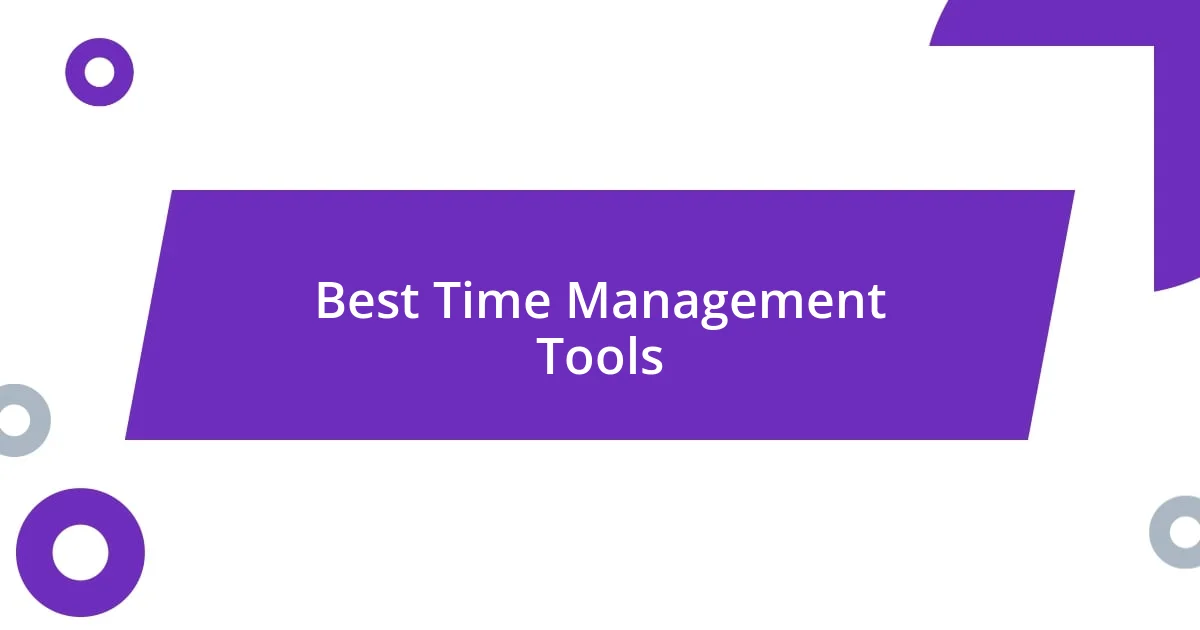
Best Time Management Tools
Time management tools can really transform the way we study. Personally, I’ve found apps like Todoist and Trello to be invaluable. They not only let me break down tasks but also allow me to visualize my workload, which keeps me grounded when I have a packed schedule. Have you ever felt that overwhelming sensation when looking at a long to-do list? These tools help me tackle that feeling by breaking things down into smaller, more manageable chunks, almost like a personal guide through the chaos.
One of my favorite features of time management apps is the countdown timer that many of them offer. For example, using the Pomodoro Technique with an app like Forest has been a game-changer for me. I remember sitting at my desk, struggling to concentrate, and I set a 25-minute timer. The moment I focused, I felt that rush of productivity enveloping me. Knowing I only had to work in short, focused bursts made studying more bearable and actually enjoyable. It’s fascinating how something as simple as a timer can lead you to be more productive, don’t you think?
Lastly, I can’t stress enough the importance of goal-setting functionalities within these apps. I often set weekly goals on Asana, and tracking my progress gives me a sense of accomplishment. I remember setting a goal to tackle three chapters in one week, and seeing that progress bar fill up was incredibly rewarding! It’s not just about the tasks; it’s about celebrating those small victories that keep us motivated. When you set and achieve these mini-goals, it propels you toward your larger objectives, making studying feel less like a chore and more like a journey.
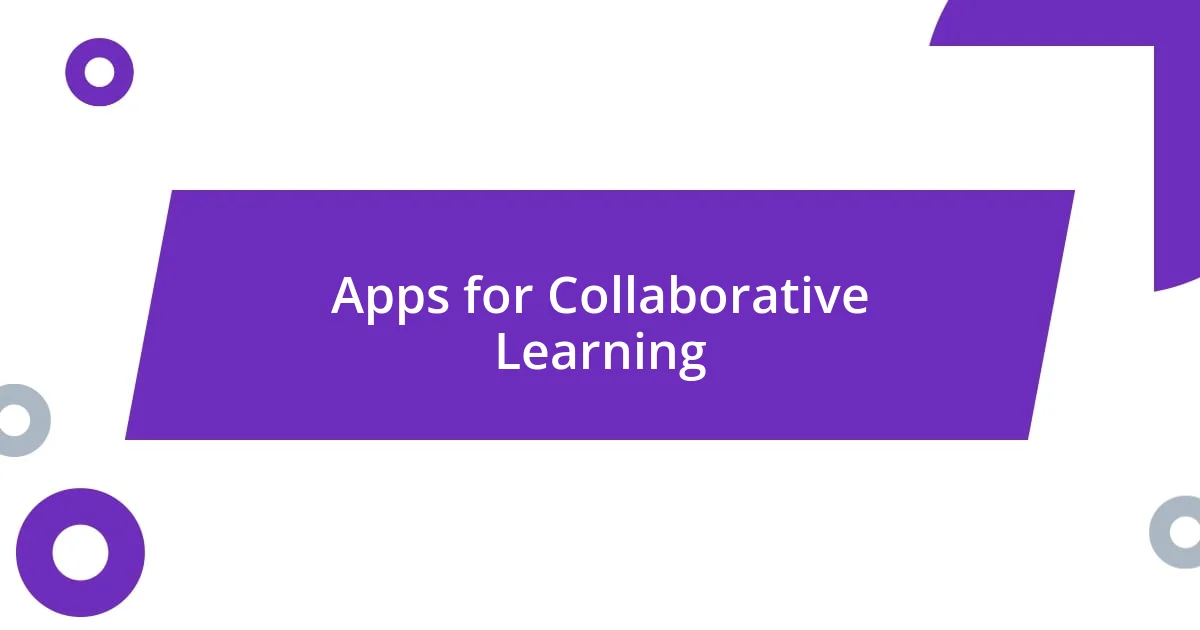
Apps for Collaborative Learning
When it comes to collaborative learning, having the right apps can make all the difference. For instance, I often turn to Google Drive for group projects. Sharing documents and brainstorming in real-time feels seamless, almost like we’re in the same room even when we’re miles apart. I remember a group assignment where one teammate suggested an idea; we bounced thoughts off each other, and suddenly, we created something much richer than I could have imagined.
Then there’s Slack, which has dramatically changed how I communicate with study groups. The channels allow us to divide topics and keep discussions organized. I recall a late-night session where we used Slack to share quick feedback on each other’s essays. It’s amazing how a simple message can spark a lively debate or lead to a compelling suggestion, reinforcing that collective effort really amplifies our understanding.
Moreover, I cannot overlook Zoom for virtual study sessions. It’s not just about video calls; I love using the screen-sharing feature to showcase my notes and discuss difficult concepts together. Once during a tough revision week, we came together on Zoom, and the group energy was palpable. Everyone contributed insights, which made those challenging topics seem manageable. Don’t you find that collaborating this way not only enhances our learning but also builds a sense of community among us?
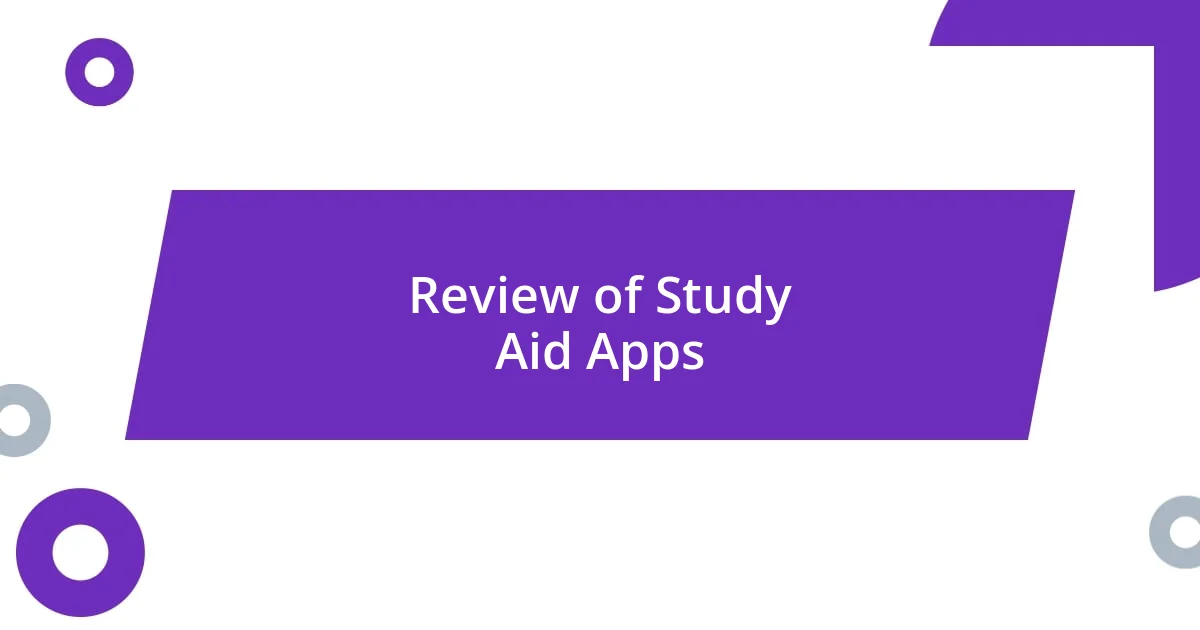
Review of Study Aid Apps
When diving into study aid apps, I can’t help but rave about Anki, the flashcard app that has transformed my retention rates. Creating personalized flashcards with images and audio has made memorizing challenging concepts not just effective but enjoyable. I remember the thrill of quizzing myself and realizing I could recall details that seemed daunting just weeks prior. Have you ever experienced that moment when something clicks in your mind, and suddenly, it all makes sense? Anki has consistently delivered that joy for me.
Another standout is Notion. Its versatility truly sets it apart. I can organize my notes, create databases, and even track project timelines—it’s like having a digital binder that grows with me. I once crafted a study hub for my final exams that pulled together assorted resources all in one place. When I revisited that hub during finals week, I felt a comfort in knowing everything I needed was right at my fingertips. Doesn’t it feel satisfying when studying becomes less about scattered papers and more about a well-curated collection of your work?
Lastly, I have to highlight Quizlet. It’s not just the flashcards; the ability to engage in games and quizzes has added a layer of fun to my study sessions. I distinctly recall one evening when I was cramming for a history test, and I jumped into Quizlet’s Match game. It felt less like studying and more like a friendly competition with myself. This gamified approach not only lightened the stress but also solidified my learning, turning those late-night sessions into something enjoyable. Who would have thought studying could feel like playtime?














